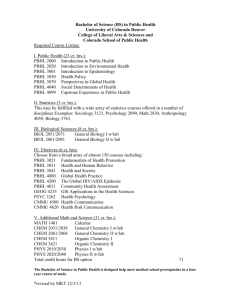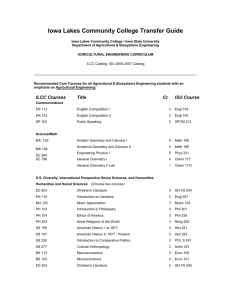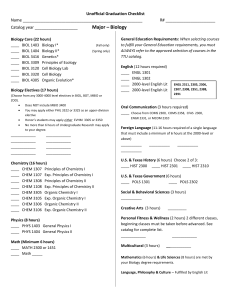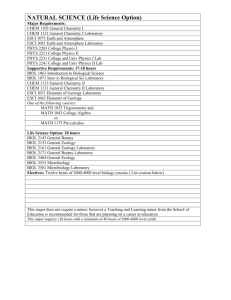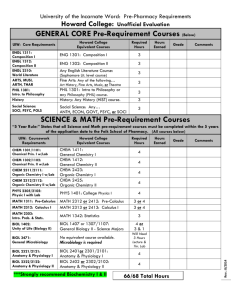Biological Sciences (BS) Program Description
advertisement
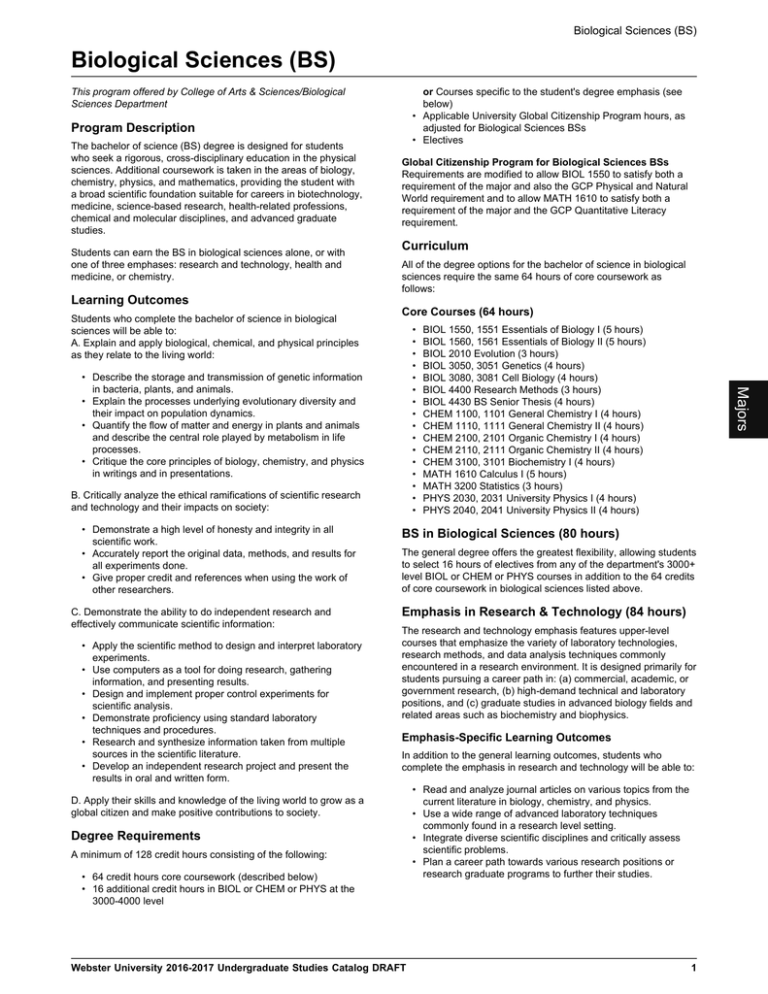
Biological Sciences (BS) Biological Sciences (BS) This program offered by College of Arts & Sciences/Biological Sciences Department or Courses specific to the student's degree emphasis (see below) • Applicable University Global Citizenship Program hours, as adjusted for Biological Sciences BSs • Electives Program Description The bachelor of science (BS) degree is designed for students who seek a rigorous, cross-disciplinary education in the physical sciences. Additional coursework is taken in the areas of biology, chemistry, physics, and mathematics, providing the student with a broad scientific foundation suitable for careers in biotechnology, medicine, science-based research, health-related professions, chemical and molecular disciplines, and advanced graduate studies. Students can earn the BS in biological sciences alone, or with one of three emphases: research and technology, health and medicine, or chemistry. Global Citizenship Program for Biological Sciences BSs Requirements are modified to allow BIOL 1550 to satisfy both a requirement of the major and also the GCP Physical and Natural World requirement and to allow MATH 1610 to satisfy both a requirement of the major and the GCP Quantitative Literacy requirement. Curriculum All of the degree options for the bachelor of science in biological sciences require the same 64 hours of core coursework as follows: Learning Outcomes Students who complete the bachelor of science in biological sciences will be able to: A. Explain and apply biological, chemical, and physical principles as they relate to the living world: Core Courses (64 hours) • Describe the storage and transmission of genetic information in bacteria, plants, and animals. • Explain the processes underlying evolutionary diversity and their impact on population dynamics. • Quantify the flow of matter and energy in plants and animals and describe the central role played by metabolism in life processes. • Critique the core principles of biology, chemistry, and physics in writings and in presentations. B. Critically analyze the ethical ramifications of scientific research and technology and their impacts on society: • Demonstrate a high level of honesty and integrity in all scientific work. • Accurately report the original data, methods, and results for all experiments done. • Give proper credit and references when using the work of other researchers. C. Demonstrate the ability to do independent research and effectively communicate scientific information: • Apply the scientific method to design and interpret laboratory experiments. • Use computers as a tool for doing research, gathering information, and presenting results. • Design and implement proper control experiments for scientific analysis. • Demonstrate proficiency using standard laboratory techniques and procedures. • Research and synthesize information taken from multiple sources in the scientific literature. • Develop an independent research project and present the results in oral and written form. BIOL 1550, 1551 Essentials of Biology I (5 hours) BIOL 1560, 1561 Essentials of Biology II (5 hours) BIOL 2010 Evolution (3 hours) BIOL 3050, 3051 Genetics (4 hours) BIOL 3080, 3081 Cell Biology (4 hours) BIOL 4400 Research Methods (3 hours) BIOL 4430 BS Senior Thesis (4 hours) CHEM 1100, 1101 General Chemistry I (4 hours) CHEM 1110, 1111 General Chemistry II (4 hours) CHEM 2100, 2101 Organic Chemistry I (4 hours) CHEM 2110, 2111 Organic Chemistry II (4 hours) CHEM 3100, 3101 Biochemistry I (4 hours) MATH 1610 Calculus I (5 hours) MATH 3200 Statistics (3 hours) PHYS 2030, 2031 University Physics I (4 hours) PHYS 2040, 2041 University Physics II (4 hours) Majors • • • • • • • • • • • • • • • • BS in Biological Sciences (80 hours) The general degree offers the greatest flexibility, allowing students to select 16 hours of electives from any of the department's 3000+ level BIOL or CHEM or PHYS courses in addition to the 64 credits of core coursework in biological sciences listed above. Emphasis in Research & Technology (84 hours) The research and technology emphasis features upper-level courses that emphasize the variety of laboratory technologies, research methods, and data analysis techniques commonly encountered in a research environment. It is designed primarily for students pursuing a career path in: (a) commercial, academic, or government research, (b) high-demand technical and laboratory positions, and (c) graduate studies in advanced biology fields and related areas such as biochemistry and biophysics. Emphasis-Specific Learning Outcomes In addition to the general learning outcomes, students who complete the emphasis in research and technology will be able to: D. Apply their skills and knowledge of the living world to grow as a global citizen and make positive contributions to society. Degree Requirements A minimum of 128 credit hours consisting of the following: • 64 credit hours core coursework (described below) • 16 additional credit hours in BIOL or CHEM or PHYS at the 3000-4000 level Webster University 2016-2017 Undergraduate Studies Catalog DRAFT • Read and analyze journal articles on various topics from the current literature in biology, chemistry, and physics. • Use a wide range of advanced laboratory techniques commonly found in a research level setting. • Integrate diverse scientific disciplines and critically assess scientific problems. • Plan a career path towards various research positions or research graduate programs to further their studies. 1 Biological Sciences (BS) Biological Sciences (BS) A minimum of 6 credit hours selected from the following: Degree Requirements for the Emphasis in Research & Technology • • • • • • • • • In addition to the 64 credit hours of core coursework in biological sciences, the following courses are required for the emphasis in research and technology: • BIOL 3900 Journal Club (3 hours) • BIOL 4700 Independent Research in Biology I (2 hours) or CHEM 4700 Independent Research in Chemistry I (2 hours) or PHYS 4700 Independent Research in Physics I (2 hours) A minimum of 9 credit hours selected from the following: • • • • • • • *Only approved Topics courses can count toward this emphasis BIOL 3120, 3121 Microbiology (4 hours) BIOL 3200, 3201 Ecology (4 hours) BIOL 3400 Cell Culture (3 hours) BIOL 3600 Topics in Biology* (3-4 hours) BIOL 3700, 3701 Plant Physiology (4 hours) BIOL 4000, 4001 Methods in Molecular Biology (4 hours) BIOL 4050 Gene Expression (3 hours) Emphasis in Chemistry (82 hours) The emphasis in chemistry is designed for students who desire to further expand and deepen their knowledge in the field of chemistry. It is particularly well-suited for students who are interested in pharmaceuticals and for those pursuing laboratory positions or graduate studies in areas involving chemical techniques. This track requires additional coursework in mathematics and advanced chemistry courses, and the electives include biology courses that contain a significant chemical component. In addition, students pursuing the chemistry track are expected to develop a senior thesis research topic that has a significant chemical basis. A minimum of 6 credit hours selected from the following: • • • • • • • CHEM 3110, 3111 Biochemistry II (4 hours) CHEM 3500, 3501 Physical Chemistry I (4 hours) CHEM 3510, 3511 Physical Chemistry II (4 hours) CHEM 3600 Topics in Chemistry* (3-4 hours) CHEM 3700, 3701 Fluorescence (4 hours) CHEM 4100 Inorganic Chemistry (3 hours) MATH 3210 Mining Foundations (3 hours) or MATH 3220 Data Mining Methods (3 hours) Emphasis-Specific Learning Outcomes In addition to the general learning outcomes, students who complete the emphasis in chemistry will be able to: *Only approved Topics course can count towards this emphasis Emphasis in Health & Medicine (82 hours) The emphasis in health and medicine is designed for students interested in a continuing education in any of the various medical fields, particularly those pursuing a pre-professional program like pre-med or pre-vet. It is meant primarily for students preparing for careers such as medical doctors, physician's assistants, dentists, veterinarians, chiropractors, physical therapists, or athletic trainers. In addition to the science courses listed below, students entering health and medical fields are encouraged to take 4 semesters of a foreign language and 2 semesters of writing intensive courses. Emphasis-Specific Learning Outcomes In addition to the general learning outcomes, students who complete the emphasis in health and medicine will be able to: • Describe the role of biological, chemical, and physical principles as they relate to the functioning of humans and animals. • Understand the mechanisms of sickness and disease at the molecular and cellular level. • Plan a career in various health related professions or seek admission to professional programs to further their studies. BIOL 3120, 3121 Microbiology (4 hours) BIOL 3150 Nutrition (3 hours) BIOL 3800 Medical Terminology (3 hours) BIOL 4300 Immunology (3 hours) BIOL 4500 Virology (3 hours) BIOL 3600 Topics in Biology* (3-4 hours) CHEM 3600 Topics in Chemistry* (3-4 hours) BIOL 4700 Independent Research in Biology (up to 3 hours) CHEM 4700 Independent Research in Chemistry (up to 3 hours) • Describe the role of biological, chemical, and physical principles as they relate to the functioning of humans and animals. • Explain the mechanisms of sickness and disease at the molecular and cellular level. • Plan a career path in various health related professions or research professional programs to further their studies. Degree Requirements for the Emphasis in Chemistry In addition to the 64 credit hours of core coursework in biological sciences, the following courses are required for the emphasis in chemistry: • CHEM 3110, 3111 Biochemistry II (4 hours) • MATH 1620 Calculus II (5 hours) • Minimum of 9 credit hours of 3000+ level CHEM electives. (Up to 3 credit hours of CHEM 4700 can be used towards this emphasis) Admission Students who are interested in applying to this degree program should see the Admission Section of this catalog for general requirements. Degree Requirements for the Emphasis in Health & Medicine In addition to the 64 credit hours of core coursework in biological sciences, the following courses are required for the emphasis in health and medicine: • BIOL 3010, 3011 Anatomy & Physiology I (4 hours) • BIOL 3020, 3021 Anatomy & Physiology II (4 hours) • CHEM 3110, 3111 Biochemistry II (4 hours) 2 Webster University 2016-2017 Undergraduate Studies Catalog DRAFT



